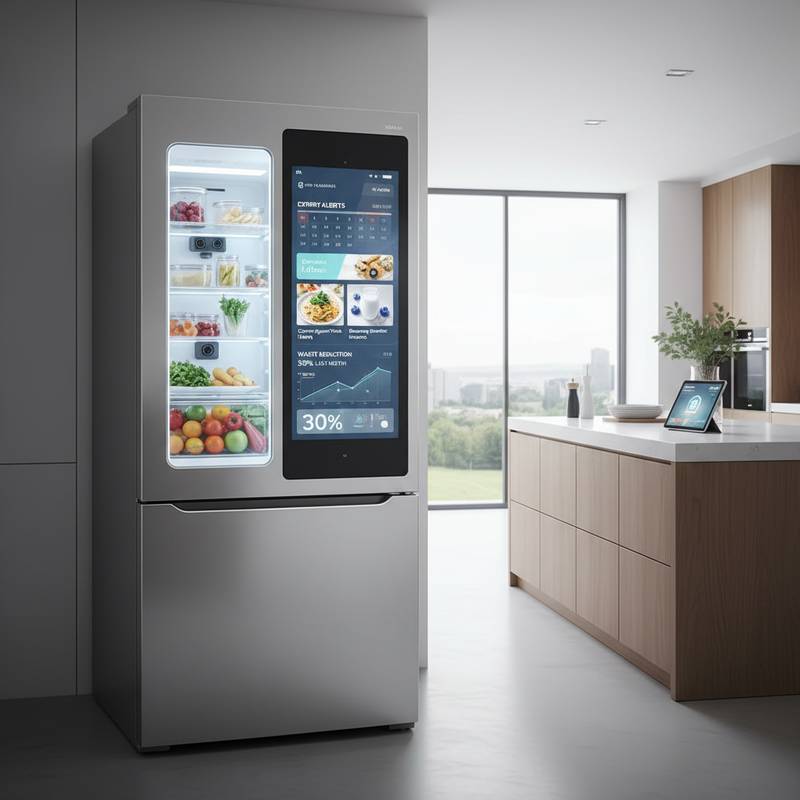Eliminate Food Waste with AI Fridge Expiry Tracking
Smart kitchens evolve from spaces focused on convenience into connected systems that anticipate needs. Artificial intelligence-powered refrigerators lead this change by monitoring expiry dates, recommending recipes, and minimizing waste through automation. These appliances integrate computer vision, data analysis, and mobile applications to manage food storage and usage with precision.
Food waste represents a significant yet often overlooked expense in daily life. Produce spoils, leftovers remain hidden, and expiration dates escape notice amid hectic routines. Households striving for nutritious meals face these issues, which accumulate over time. AI refrigerators address this by providing real-time oversight and proactive notifications.
The Growing Problem of Food Waste
Research indicates that households discard a substantial amount of purchased food. Perishables such as fruits, vegetables, and dairy products lead in waste volume. This practice impacts personal finances and exacerbates environmental concerns, including methane emissions from landfills.
Families recognize the issue but struggle with inventory management. Items enter and exit refrigerators rapidly, outpacing manual methods like notes or basic apps. The core challenge lies in limited visibility into contents and timelines. Advanced refrigeration technology introduces automation to enhance awareness.
How an AI Fridge Tracks Expiry Dates
These refrigerators employ internal cameras, barcode readers, and recognition software to catalog items upon placement. The system logs acquisition dates, estimates remaining shelf life based on product types, and issues alerts as deadlines approach. Integration with delivery services updates stocks automatically upon receipt of new groceries.
Image recognition processes visual data to identify items by form, hue, and packaging. It differentiates between similar products, such as milk versus yogurt, regardless of labels. As usage patterns emerge, the AI refines predictions, prioritizing frequently consumed goods and minimizing unnecessary notifications. This personalization aligns alerts with specific household dynamics.
Why Smart Expiry Tracking Matters
Beyond financial savings, this feature fosters improved routines. Precise knowledge of inventory and timelines streamlines meal preparation and sparks creativity. Users avoid discovering wilted greens; instead, they receive suggestions for utilizing items promptly, such as blending overripe bananas into batter.
Surveys among owners of connected appliances reveal that over 50 percent experience notable waste reduction. Remote access via applications allows inventory checks from anywhere, aiding decisions at stores or during evening planning. The refrigerator functions as an accessible, dynamic catalog.
Real-World Examples Leading the Way
Leading manufacturers incorporate AI tracking in premium models. Built-in cameras snap photos with each door closure, while others scan barcodes during unpacking. Associated applications process this information to deliver targeted messages, like alerts for expiring berries or prompts to incorporate leftover proteins.
Certain brands connect to extensive recipe libraries. Approaching expirations trigger recommendations featuring those ingredients prominently. For instance, notifications might propose a vegetable stir-fry using carrots, broccoli, and bell peppers on the verge of spoilage. Such features alleviate planning burdens while curbing discards.
The Shift Toward Smarter Kitchens
AI refrigerators signal a wider trend in interconnected cooking environments. Demand grows for tools that ease chores and promote efficiency. Experts forecast that soon, the majority of new appliances will feature predictive algorithms.
This integration merges eco-friendliness with practicality, resonating with user priorities. Devices like these close the divide between informed choices and routine actions, embedding responsible habits into cooking seamlessly.
Overcoming Barriers to Adoption
Initial costs exceed those of standard units, and some hesitate over in-home surveillance. Data privacy warrants attention, particularly with consumption profiling.
Companies respond through explicit policies and on-device processing, keeping images local. As affordability improves and confidence builds, uptake accelerates. Regular cooks recoup expenses via reduced waste and streamlined operations.
Integration with Broader Smart Home Systems
Future developments emphasize seamless links to home networks. Envision the refrigerator syncing with assistants, shopping platforms, and cooking devices. Detection of nearing-expiry produce could generate recipe ideas, adjust oven settings, and queue supplemental purchases.
Existing setups already pair refrigerators with audio devices and screens. This interoperability creates responsive spaces that foresee requirements, shifting from reactive tools to anticipatory aids.
Sustainability and the Bigger Picture
Technology-driven waste reduction benefits individuals and the planet. Discarded food drives resource depletion and emissions. Prolonging usability cuts these effects, advancing eco-conscious systems.
Policymakers and advocates highlight tech's potential in conservation. Such tools enable effortless contributions to green initiatives. Each preserved portion advances broader ecological aims.
The User Experience: Convenience Meets Awareness
Owners value the simplicity of notifications, list generation, and schedule alignment for meals. Families monitor child nutrition accurately, and wellness-focused individuals verify freshness reliably.
This blend of insight and efficiency redefines kitchen interactions. Storage evolves into management support, rendering planning instinctive and procurement judicious.
What to Look for When Choosing an AI Refrigerator
Evaluate these aspects prior to selection:
- Image recognition accuracy: Select units that detect diverse foods with minimal user effort.
- App integration: Prioritize compatibility with existing shopping and cooking applications.
- Energy efficiency: Opt for models that adjust cooling intelligently to lower utility bills.
- Privacy settings: Confirm local data handling and user controls over sharing.
- Ease of use: Favor intuitive designs and straightforward installation for all household members.
Implementing AI Tracking in Your Kitchen
AI expiry monitoring elevates daily efficiency, sustainability, and ease. Benefits compound as systems adapt to preferences, delivering tailored support.
For those aiming to minimize discards, economize, and modernize routines, this represents a strategic advancement. Explore options to integrate such capabilities, fostering innovative home practices.
The forward-thinking kitchen emphasizes perception and flexibility. A device that oversees freshness, proposes uses, and aids conservation serves as an essential ally in responsible homemaking.
